ISLAMABAD: Pakistan on Thursday rejected the United States’ annual report on terrorism for 2019, which accused Pakistan of continuing to be a ‘safe haven’ for certain regional terrorist groups.
“We are disappointed with the US State Department’s Annual Country Report on Terrorism for 2019, which is self-contradictory and selective in its characterization of Pakistan’s efforts for countering terrorism and terrorist financing,” Pakistan Foreign Office (FO) said in a statement.
The US report released on June 24 looked at global counter-terrorism trends during the past year and alleged that “Pakistan allowed groups targeting Afghanistan, including the Afghan Taliban and the affiliated Haqqani Network, as well as groups targeting India, such as the Lashkar-e-Taiba (LeT), its affiliated organizations, and the Jaish-e-Muhammad (JeM), to operate from its territory.”
Islamabad said that “while the report recognizes that Al-Qaeda has been seriously degraded in the region, it neglects to mention Pakistan’s crucial role in decimating Al-Qaeda, thereby diminishing the threat that the terrorist group once posed to the world.”
Foreign office spokesperson Aisha Farooqui said, “The Report acknowledges the sharp decrease in the incidence of terrorist attacks in Pakistan. However, it neglects to explain that this was only possible because Pakistan’s resolute counter-terrorism operations have targeted proscribed groups and outfits without discrimination.”
She said Pakistan rejects any insinuation about any safe haven and it will not allow any group or entity to use its territory against any country.
“On the contrary, it is Pakistan that faces the threat of terrorism from externally based and foreign sponsored groups, like the TTP, Daesh-K and others,” she said. “The Report is again either silent or vague on the origins and locations of these terrorist groups.”
Farooqui said, “Pakistan remains committed to fulfilling its obligations under the UNSC 1267 sanctions regime for the freezing of assets and denial of funds and economic resources to all designated entities and individuals,” and added that in recent months, Pakistan has prosecuted and convicted the leadership of several proscribed groups.
Pakistan also continued to implement the Financial Action Task Force (FATF) action plan, and has undertaken wide ranging and systemic reforms to that end, Farooqui continued.
“While it notes the progress made by Pakistan under the action plan, the report did not capture the political commitment, revamping of Pakistan’s AML/CFT [anti-money laundering and countering financing of terrorism] regime, and our consistent and sustainable actions which have also been recognized by FATF,” the FO said.
It added that the report had also failed to acknowledge the full extent of Pakistan’s support for the Afghan peace process and facilitation of US-Taliban direct talks culminating in the Peace Agreement of 29 February 2020.
Pakistan’s former ambassador to the US, Ali Sarwer Naqvi, said that although the report was critical of Pakistan, it did recognize many positive steps which the country has taken during the past one year.
“The effect of this report will be somewhat critical but not highly critical as previous reports were more critical to us,” Naqvi told Arab News.
“There are many countries including USA, United Kingdom, France, Germany and other developed countries which have terrorist organizations but it did not mean that their governments support them. United States should consider this aspect as well,” he added.
Dr. Abid Qaiyum Suleri, executive director of Sustainable Development Policy Institute (SDPI), who is also a member of Prime Minister’s economic advisory committee, said the report can create challenges for Pakistan in the upcoming FATF review in October.
“The US and India can use this report in FATF’s upcoming review. Pakistan has three months to take more steps to satisfy FATF and mitigate the effects of this report,” he told Arab News.
“Pakistan has improved jurisdictions of its law enforcement agencies vis-a-vis money laundering and terror financing,” he said hoping that the report would not undermine these positive developments in the financial watchdog’s upcoming plenary.
Pakistan slams US report on terrorism as 'self-contradictory, selective'
https://arab.news/na696
Pakistan slams US report on terrorism as 'self-contradictory, selective'
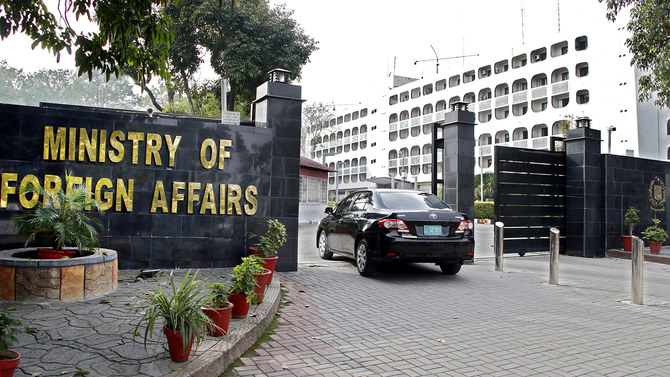
- Says the report neglects to mention Pakistan’s crucial role in decimating Al-Qaeda
- Rejects any insinuation of safe haven for regional terrorist groups
Pakistan eye comeback against New Zealand in fourth T20I today
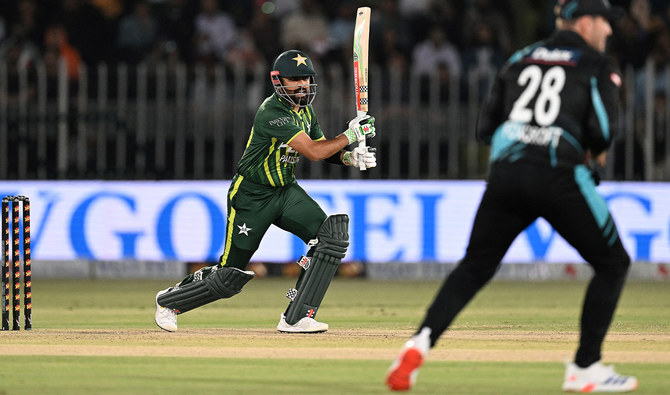
- A second-string New Zealand squad beat Pakistan by seven wickets on Sunday in Rawalpindi
- Skipper Babar Azam says pacers Shaheen Shah Afridi, Naseem Shah have ability to make comeback
ISLAMABAD: Pakistan will be eyeing a comeback today, Thursday, in the fourth match of the T20I series against New Zealand in Lahore after suffering a defeat at the hands of a second-string Kiwi squad last week.
Pakistan will head into today’s match against Michael Bracewell’s squad without star batter and wicketkeeper Muhammad Rizwan, who has been pulled from the series after he felt discomfort in his right hamstring.
New Zealand are missing key players including Trent Boult and skipper Kane Williamson as they opted to play in the lucrative Indian Premier League (IPL) while pulled out of the Pakistan series due to injuries.
Despite that, the Kiwis managed to beat Pakistan on Sunday by seven wickets in Rawalpindi, shocking the 2009 T20I world champions on their own turf.
“We did not lose because of any two or three players,” Pakistan captain Babar Azam said at a press conference in Lahore on Wednesday night. “We lost as a team. In the batting, bowling and fielding [areas] we did collapse a little.”
Pakistan’s premium fast bowlers Naseem Shah and Shaheen Shah Afridi failed to impress against New Zealand in the third T20I. However, Azam backed both bowlers, describing them as Pakistan’s “best” bowlers.
“They know how to make a comeback, even if it [bad performance] happens in one game. It is part of life,” he said. “It can’t happen that one person performs every single day.”
The series is an important one for both sides as they gear up for the ICC T20 World Cup 2024 in the West Indies and USA scheduled to be held in June.
The last match of the Pakistan-New Zealand series will be played in Lahore on May 27. Pakistan and New Zealand have both won one match against each other so far, with the first T20I fixture washed away by rain.
The match begins at 7:30 p.m. Pakistan Standard Time.
Pakistan suffered more from Afghan ‘imbroglio’ than wars with India — special envoy to Kabul
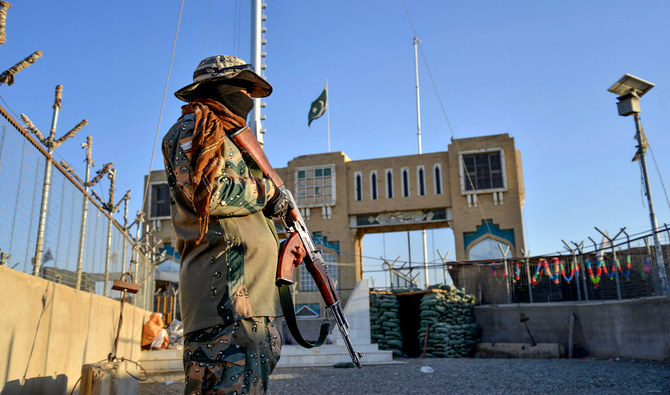
- Ambassador Durrani hopes Pakistan will overcome security threats from Afghanistan through diplomacy
- He warns of growing hostilities in the Middle East, saying the Iran-Israel conflict can engulf the region
ISLAMABAD: Pakistan’s Special Representative for Afghanistan Ambassador Asif Durrani acknowledged that his country had suffered a great deal more due to the volatility in its northwestern neighborhood than its recurrent wars in the east with nuclear-armed India while addressing a conference on Wednesday.
Durrani issued the statement during a penal discussion at the Institute of Strategic Studies Islamabad while sharing a broad overview of his country’s threat perception. Pakistan blamed the administration in Kabul last year in November for not doing enough to address its security concerns by clamping down on militants operating from Afghanistan.
It even maintained there was enough evidence that Afghan authorities were “facilitating” attacks launched by the Tehreek-e-Taliban Pakistan (TTP) against its people and security forces. Subsequently, Pakistan started deporting “illegal immigrants,” mostly Afghans, from its cities while citing security reasons.
“Afghanistan has become a permanent fixture in Pakistan’s regional paradigm for over four decades,” Durrani told the gathering. “In terms of blood and treasure, Pakistan has suffered more due to the Afghan imbroglio than its three wars with India.”
“Over 80,000 Pakistanis have died in the past two decades during the so-called war on terror,” he continued. “The country is still counting its dead and injured. After the withdrawal of the NATO forces, it was hoped that peace in Afghanistan would bring peace in the region. However, such expectations were short-lived.”
Durrani maintained that TTP attacked had increased by 65 percent after the departure of international forces while suicide bombings had shot up by 500 percent.
“The TTP’s enhanced attacks on Pakistan while using Afghan soil have been a serious concern for Pakistan,” he said. “Another worrying aspect is the participation of Afghan nationals in these attacks.”
He hoped that his country would overcome threats emerging from Afghanistan through diplomatic means, though he warned of the rising tensions in the Middle East while pointing out that the Iran-Israel conflict, if not contained, could engulf the whole region.
“Pakistan will also suffer,” he added.
Durrani said the estimated economic cost suffered by his country since the US-led “war on terror” was somewhere around $150 billion.
Pakistan doubles down on completing Iran gas pipeline despite threat of sanctions
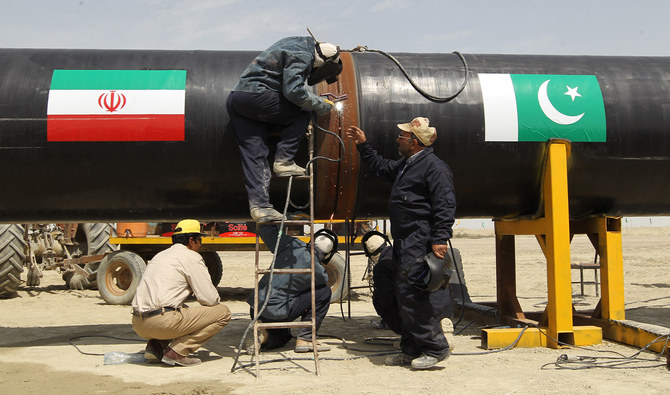
- Major gas pipeline deal has faced delays due to geopolitical issues and international sanctions
- On Wednesday, US warned that countries doing business with Iran faced the “potential risk of sanctions”
ISLAMABAD: Defense Minister Khawaja Asif said on Thursday Pakistan would find a way to complete a major gas pipeline deal with Iran which has faced delays for years due to geopolitical issues and international sanctions.
During a visit by Iranian President Ebrahim Raisi to Pakistan this week, the two nations reiterated the importance of cooperation in the energy domain, including trade in electricity, power transmission lines and the IP Gas Pipeline Project, a joint statement released following the culmination of the visit said.
“We will find a way to complete it,” Asif told reporters when asked if Pakistani officials had discussed the stalled pipeline with Raisi.
In March, Islamabad said it would seek a US sanctions waiver for the pipeline. However, later that week, the US said publicly it did not support the project and cautioned about the risk of sanctions in doing business with Tehran.
On Wednesday, the United States once again warned that countries doing business with Iran faced the “potential risk of sanctions.”
“Just let me say broadly, we advise anyone considering business deals with Iran to be aware of the potential risk of sanctions,” a State Department spokesperson said when asked about the Iranian president’s Pakistan visit and agreements signed. “But ultimately, the government of Pakistan can speak to their own foreign policy pursuits.”
The pipeline deal, signed in 2010, envisaged the supply of 750 million to a billion cubic feet per day of natural gas for 25 years from Iran’s South Pars gas field to Pakistan to meet Pakistan’s rising energy needs. The pipeline was to stretch over 1,900 kilometers (1,180 miles) — 1,150 km within Iran and 781 km within Pakistan.
Tehran says it has already invested $2 billion to construct the pipeline on its side of the border, making it ready to export. Pakistan, however, did not begin construction and shortly after the deal said the project was off the table for the time being, citing international sanctions on Iran as the reason.
Iran’s oil minister at the time responded by saying that Iran carried out its commitments and expects Pakistan to honor its own, adding that Pakistan needs to pick up the pace of work.
In 2014, Pakistan asked for a 10-year extension to build the pipeline, which expires in September this year. Iran can take Pakistan to international court and fine the country. Local media reported that Pakistan can be fined up to $18 billion for not holding up its half of the agreement.
Faced with a potential fine, Pakistan’s caretaker administration earlier this year gave the go ahead in principle to commence plans to build an 80 km segment of the pipeline. In March, Pakistan announced it would seek a sanctions’ waiver.
Washington’s support is crucial for Pakistan as the country looks to sign a new longer term bailout program with the International Monetary Fund (IMF) in coming weeks.
Pakistan, whose domestic and industrial users rely on natural gas for heating and energy needs, is in dire need for cheap gas with its own reserves dwindling fast and LNG deals making supplies expensive amidst already high inflation.
Iran has the world’s second-largest gas reserves after Russia, according to BP’s Statistical Review of World Energy, but sanctions by the West, political turmoil and construction delays have slowed its development as an exporter.
Originally, the deal also involved extending the pipeline to India, but Delhi later dropped out of the project.
With inputs from Reuters
Pakistan refiners, fuel station owners oppose price deregulation, fear business closures
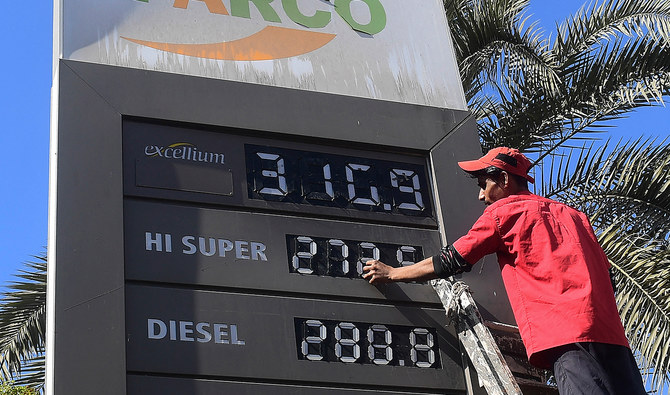
- Petroleum dealers say government wants to avoid public criticism and shift the burden of high oil prices to consumers
- Oil refineries also opposed deregulation earlier this week, saying it would put their $6 billion investment at risk
KARACHI: After Pakistan’s oil refineries, petroleum dealers announced their decision to oppose the deregulation of fuel prices in the country on Thursday, saying the move would adversely impact their businesses and lead to their closure.
The Oil and Gas Regulatory Authority (OGRA) of Pakistan briefed the energy ministry on the possible deregulation of petroleum products on April 17, prompting five of the country’s oil refineries to write a letter in which they described it as complex and critical issue.
The deregulation proposal would empower oil marketing companies to determine fuel prices on the basis of various market forces. Local consumers getting petrol and diesel from places closer to ports and refineries would get relatively cheaper products due to the transportation cost.
“The deregulation is the death warrant for the people and the petroleum industry in the country,” Abdul Sami Khan, Chairman of Pakistan Petroleum Association, said at a media briefing along with other dealers at the Karachi Press Club. “If this is imposed on us, we will be compelled to shut down our businesses.”
The dealers present at the briefing said the deregulation would cause an increase in the prices of petroleum products and make it difficult to maintain the quality of the fuel.
They said giving mandate to oil marketing companies to determine oil prices would be unwise and lead to different market rates.
“The government wants to shift the burden of price hike to people and get rid of the public criticism amid spiraling rates of petroleum products,” Khan added.
He said the smuggled Iranian oil had been openly sold in Pakistan, though it was not refined and damaged engines of vehicles.
He also asked the government to legalize it “in the larger public interest.”
“An agreement should be made to import crude oil from Iran to end smuggling,” Khan suggested. “The crude oil bought from Iran can be refined locally.”
Malik Khuda Buksh, senior leader and founding member of the association, said the deregulation would “create chaos in the market” since everyone would be quoting their own prices.
“Under the current mechanism, the government fixes the prices and no one can charge a single paisa more,” he explained while speaking to Arab News after the news briefing. “When the deregulation takes place, every oil marketing company will give its own price like vegetable and other product sellers, which will lead to further inflation.”
Like refiners, the petroleum dealers also warned that the deregulation of petroleum prices in Pakistan would negatively impact their business.
The letter jointly written by Attock Refinery Limited, Cnergyico PK Limited, National Refinery Limited, Pakistan Refinery Limited and Pak Arab Refinery Limited said the deregulation could jeopardize nearly $6 billion of investment.
The letter maintained it was better to spend money on upgrading the refineries since it would not only result in cleaner and environment-friendly fuels of Euro-V specifications but would also help save precious foreign exchange by substantially increasing local production.
Pakistan women’s great Bismah Maroof retires from international cricket

- Maroof, an allrounder, batted left-handed and scored 6,262 runs including 33 half-centuries
- Maroof captained Pakistan in 96 internationals, including at fourth World Cup in 2022
LAHORE: Former Pakistan women’s captain Bismah Maroof retired from international cricket on Thursday after 276 games in an 18-year career.
“I have decided to retire from the game I love the most,” the 32-year-old Maroof said in a statement on Thursday. “It has been an incredible journey, filled with challenges, victories, and unforgettable memories.”
Maroof, an allrounder, batted left-handed and scored 6,262 runs including 33 half-centuries — three ODI scores in the 90s — and bowled right arm leg break and bagged 80 wickets.
She was 15 when she debuted for Pakistan in 2006 in a one-day international against India, and three years later played her first Twenty20 against Ireland.
Maroof took a break in 2021 to give birth to her first child and said she was grateful for a parental policy that extended her career.
“The support from the PCB has been invaluable, particularly in implementing the first ever parental policy for me, which enabled me to represent my country at the highest level while being a mother,” Maroof said.
Maroof captained Pakistan in 96 internationals, including at her fourth Women’s World Cup in 2022 in New Zealand.










